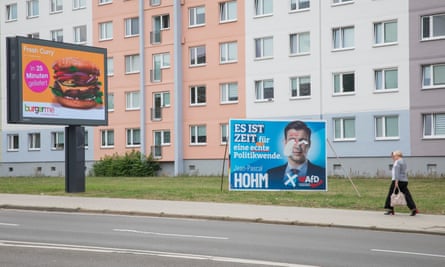
The far-right Alternative für Deutschland party is hoping to come top in an election in the German state of Brandenburg on Sunday, three weeks after making historical gains in two other regions.
The AfD, which has been classified as rightwing extremist in several states by domestic intelligence agencies, is running almost neck and neck with Chancellor Olaf Scholz’s Social Democrats (SPD) in the state, a belt of urban and rural communities that surrounds the capital, Berlin.
Final polls showed the AfD to have a very slight lead on 28%, with the SPD having considerably narrowed the gap in the last days of campaigning to reach 27%. The conservative CDU was polling at 14% and the new leftist conservative Sahra Wagenknecht Alliance (BSW) at 13%.
The Greens and the pro-business FDP, junior partners in Scholz’s increasingly fractious three-way coalition, will struggle to win the 5% needed to enter the state parliament, as will the far-left Die Linke, according to polls.
About 2.1 million people, including 100,000 first-time voters, are registered to vote, after the voting age was reduced to 16.
The ballot is being seen as a referendum on the federal government – the popularity ratings of which are at a record low – and a harbinger of the outcome of next autumn’s federal election.
The SPD has ruled in the state since reunification 34 years ago, and was the party of all three of the leaders who have governed in that time.
The SPD’s Dietmar Woidke, who has led Brandenburg for 14 years, has pledged to resign if the AfD beats his party, in what has been interpreted as a high-stakes gamble based on his own popularity as “father of the state”. The AfD has also called for Scholz to resign.

In a humiliating gesture to Germany’s leader, Woidke has not only criticised the federal government in his campaign, he has also completely excluded Scholz from it. The most unpopular chancellor on record has been barred from appearing at SPD rallies in the state, even though he and his wife, Britta Ernst, live in its capital, Potsdam.
Although one of Germany’s smallest states, population-wise, the outcome of the vote is being seen as significant for the whole country, and the results are being awaited with suspense across the continent.
On 1 September, the AfD became the strongest party in a state election for the first time in the eastern state of Thuringia, where it secured about 33% of the vote. In neighbouring Saxony, it emerged in second place, at about 30%, narrowly beaten by the governing centre-right Christian Democratic Union (CDU).
The campaign has focused on issues of immigration, energy transition, fears of economic recession and Germany’s support for Ukraine, all of which are hot button issues in the former communist-run eastern Germany in particular, with the AfD proving itself to be especially adept at tuning into voters’ concerns.
Even if the AfD wins, it is unlikely to be able to rule the state, because it will lack a majority. The other parties have put up a so-called “firewall” and have refused to work with it.
The BSW of Wagenknecht, a nine-month old breakaway group from the far-left Die Linke, is therefore likely to be a powerful element in any post-election power-broking.
Critics say the firewall is going to prove to be increasingly hard to maintain if the AfD continues to perform strongly in elections.
Nationally, all three parties in Scholz’s coalition are together polling less than the opposition CDU under Friedrich Merz, who this month was formally appointed as the party’s chancellor candidate for the federal election on 28 September 28, 2025.
 Print
Print


